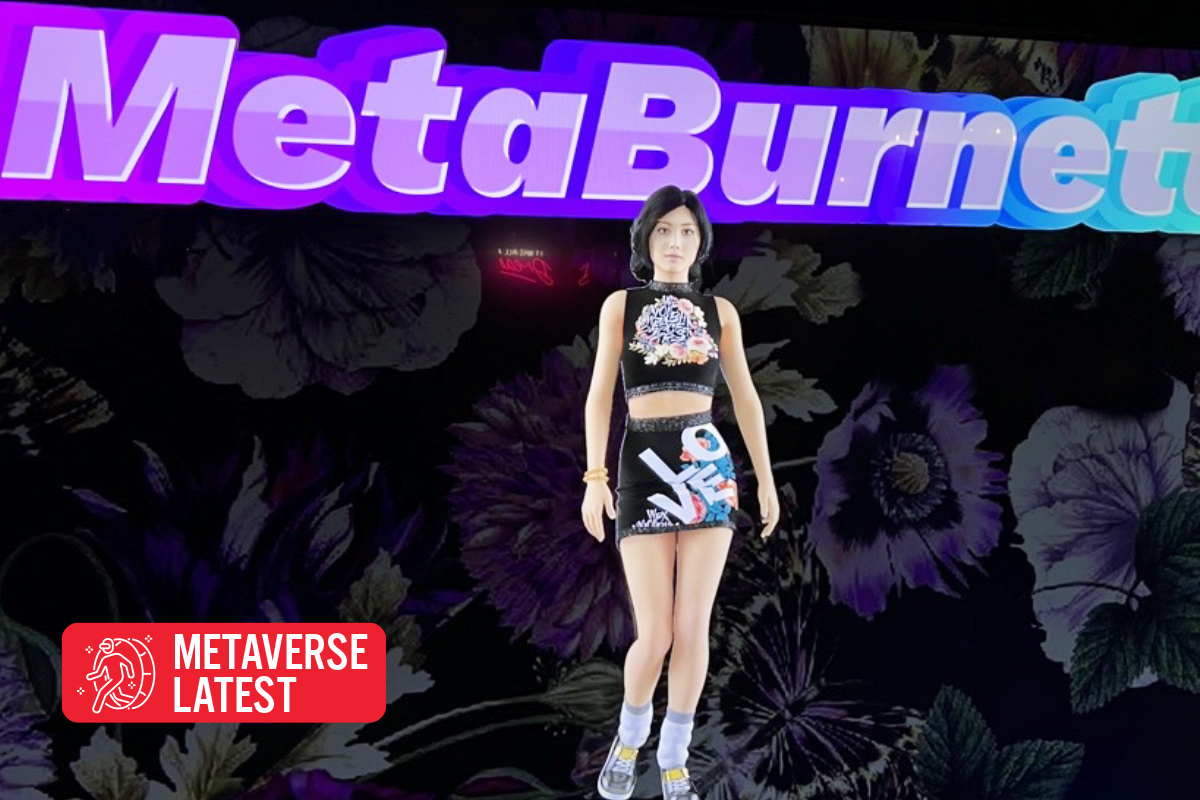
DIpil Das
Metaverse Latest
Metaverse technologies and virtual gaming have surged in popularity during the Covid19 pandemic and are continuing to evolve, grow, and converge each month. Coresight Research has identified the expanding metaverse as a key trend to watch in global retail in 2022 and beyond.
Our Metaverse Latest series provides regular updates on metaverse developments, showing how key players and new entrants are seizing opportunities in the space. We also discuss metaverse trends we have seen recently.
In this report, we present developments as of July 6, 2022, and explore the rise of augmented reality (AR) in fashion by presenting highlights from Burnett New York’s recent “MetaBurnett” event, which linked the real and virtual worlds.
Recent Metaverse Developments
Virtual Worlds and Platforms
- On June 14, 2022, Solana-backed metaverse Star Atlas announced a partnership with crypto payment gateway MoonPay, which will enable players to instantly purchase digital assets, crypto tokens and non-fungible tokens (NFTs) with credit and debit cards, representing a significant development for metaverse access.
- On June 14, 2022, esports platform GGTOOR launched a virtual experience in metaverse platform TCG World. GGTOOR purchased 2,145 parcels of land in the blockchain game for an estimated $102.3 million—a metaverse land record.
- On June 14, 2022, entertainment technology company Color Star Technologies announced that it will upgrade its Color World metaverse platform. The upgrade will feature a virtual shopping mall and new flagship stores from hundreds of brands.
- On June 16, 2022, AR esports platform ePlay Digital announced that its metaverse, Klocked World, will feature one of the first-ever metaverse pet stores. After purchase, runners can run with their virtual pets in the real world via AR.
- On June 22, 2022, Time Magazine announced a partnership with The Sandbox to recreate Times Square in the blockchain game. Much like its real-world counterpart, the virtual location will serve as a place for art and commerce; however, only holders of TIMEPieces NFTs will have access to exclusive experiences.
- On June 22, 2022, tactical shooter game Cantina Royale, developed with the Unity gaming engine, partnered with the carbon-neutral Elrond blockchain to convert itself into a play-to-earn metaverse.
- On June 22, 2022, metaverse economy developer MetaJuice announced the launch of an NFT wearables marketplace in the IMVU metaverse, home to over 1 million daily active users. MetaJuice’s marketplace will enable brands and businesses to access a thriving economy of over 200,000 creators, which, prior to this announcement, averaged over 21 million unit sales per month.
- On June 28, 2022, augmented reality video game developer Niantic unveiled the NBA All-World game, which will allow players to compete against other users in their own neighborhoods in a basketball smartphone game. Similar to Pokémon Go, the application is a “real-world metaverse,” according to Niantic.
Brands and Retailers
- On June 14, 2022, Belgian-based ice cream brand Magnum unveiled a virtual museum experience for customers attending Amsterdam’s MET AMS Festival, transporting them to Decentraland via virtual reality (VR) headsets.
- On June 14, 2022, luxury platform Farfetch announced that it would begin accepting cryptocurrency payments in partnership with crypto payment services firm Lunu. Customers will be able to scan a QR code to provide payment from their preferred crypto wallet. Farfetch had previously experimented with in-store crypto payments in March 2022 at Browns and Off-White.
- On June 14, 2022, car manufacturer Chevy announced that it would be minting and auctioning a Corvette NFT, with the winner receiving the actual car in the real world.
- On June 14, 2022, yogurt brand Chobani launched the “Chobani Oatmilk Cosmic Race” in partnership with virtual world Roblox, a promotional competition supporting its oat-based products. Users race against one another to deliver oat milk to planets while also earning rewards.
- On June 14, 2022, Happy Nation, the tween brand of Victoria’s Secret, forayed into the metaverse: the brand announced that it will host virtual obstacle courses for customers in Roblox.
- On June 14, 2022, haircare brand Sunsilk, owned by multinational consumer goods company Unilever, entered the metaverse with an immersive experience in the Roblox platform named “Sunsilk City,” aiming to encourage participation by female gamers.
- On June 14, 2022, beauty brand L’Oréal announced that it had signed a partnership agreement with esports platform Team Vitality to promote its Garnier Fructis brand. The partnership will increase the brand’s visibility with Team Vitality esports members across popular games such as Counter-Strike, League of Legends and Valorant.
- On June 14, 2022, France-based apparel retailer Lacoste launched its first NFT collection. The NFTs, depicting a crocodile emerging from water, will allow holders to co-create upcoming brand designs.
- On June 15, 2022, luxury watchmaker Tag Heuer announced that it would allow customers to connect their watches to crypto wallets such as MetaMask and Ledger Live to display their NFTs on their wristwatches.
- On June 15, 2022, L’Oréal-owned luxury brand YSL Beauty dropped its first NFT on the Polygon Blockchain as part of its Web 3.0 initiative. Instagram followers had the chance to claim a “Golden Block” NFT, which gives owners access to future NFT drops.
- On June 15, 2022, fast-food giant Wendy’s announced a new experience, “Sunrise City,” where customers can get a virtual breakfast sandwich within Meta’s Horizon Worlds. The experience also includes a town square featuring a virtual restaurant and Partnership Plaza, which has a virtual basketball court.
- On June 15, 2022, men’s cosmetics brand Axe announced a partnership with leading Fortnite content creator Kyle Giersdorf (also known as Bugha) to design a custom Axe-based island within the Fortnite universe. Rather than partnering with Fortnite developer Epic Games, Axe went directly to the virtual influencer, a growing trend.
- On June 16, 2022, Spanish airliner Vueling revealed that it had partnered with crypto payment gateway BitPay to begin accepting cryptocurrency payments on its website, starting in 2023.
- On June 16, 2022, children’s apparel brand OshKosh B’Gosh announced its intentions to enter the metaverse, launching an exclusive partnership with a network of Web 3.0 games, including Fashion Runway and Super League, to raise brand awareness.
- On June 16, 2022, skincare brand Ameōn announced a partnership with Web 3.0 infrastructure company Hypernet Labs to create “Ameōn Muse” Charity Collection of five NFTs—digitally generated characters celebrating the brand’s values.
- From June 17 to 19, 2022, Shanghai hosted the “Digital Shanghai Fashion Week” in partnership with short-video platform Douyin. More than 30 brands broadcasted live through a daily six-hour show that included virtual fashion runways and digital fashion for avatars.
- On June 20, 2022, Meta launched a digital clothing store, the “Meta Avatars Store” allowing users to purchase articles of clothing and accessories for avatars. The store features designs from Balenciaga, Prada and fashion designer Thom Browne.
- On June 20, 2022, Macy’s launched its Discord channel as well as a new collection of 10,000 NFTs in celebration of its 46th annual “Macy’s 4th of July Fireworks” event. To claim the NFT, users first had to register with the Discord channel, which has over 10,000 members as of July 4, 2022.
- On June 21, 2022, British supercar manufacturer Lotus announced a partnership with crypto payment services firm Ripple and enterprise NFT services firm NFT Pro to launch an NFT collection celebrating the brand’s history.
- On June 22, 2022, luxury brand Burberry launched a second NFT collection with Mythical Games’ blockchain-based game Blankos Block Party. The collection includes virtual boomboxes, necklaces and phone accessories, which players can add to their online portfolio of items.
- On June 22, 2022, furniture retailer IKEA released updates to its AR application, which now allows customers to remove and delete furniture from their homes as they envision home makeovers.
- On June 22, 2022, lifestyle and wellness brand Alo Yoga announced that it would begin accepting cryptocurrency payments and experimenting with NFT-related campaigns. It is also giving employees the option to be paid in crypto.
- On June 22, 2022, Meta announced that carmaker MINI (owned by BMW) will establish a MINIverse in Horizon Worlds, a VR go-kart experience. Meta also announced that guitar brand Fender would be establishing the Fender Stratoverse, a floating virtual guitar for fans to create original guitar riffs.
- On June 22, 2022, e-commerce giant eBay announced that it had acquired UK-based NFT marketplace KnownOrigin to bolster its focus on digital product.
- On June 22, 2022, home-improvement retailer Lowe’s launched a new AR application that will allow customers to visualize projects that they are working on. The application includes free downloads of furniture items to overlay in homes.
- On June 22, 2022, luxury watchmaker Hublot announced that it had partnered with crypto payment gateway BitPay to begin accepting cryptocurrency payments.
- On June 22, 2022, designer handbag brand Rebecca Minkoff launched a collection of 55 NFTs that give holders access to exclusive experiences and benefits. Select owners can earn prizes such as a one-of-a-kind handbag and limited-edition jewelry.
- On June 22, 2022, consulting giant KPMG, which uses Ethereum and Bitcoin in its corporate treasury, announced that it is entering the metaverse by creating a collaboration hub for employees from its US and Canadian division to interact and engage with one another.
- On June 24, 2022, luxury Italian brand Salvatore Ferragamo launched an NFT concept store in New York City’s Soho. Visitors can customize and interact with NFTs via a mirrored booth and mint them for free via OpenSea. The store also sells physical merchandise.
- On June 24, 2022, clothing retailer American Eagle Outfitters announced the launch of an NFT shop that will sell a limited-edition collection of digital shirts and hoodies tied to physical items; the collection is not available for purchase in cryptocurrency.
- On June 27, 2022, UK-based supercar driving service Classic Parade announced the launch of a cryptocurrency payment service for customers in celebration of its 20th anniversary.
- On June 27, 2022, sportswear brand Puma announced another Web 3.0 initiative, entering virtual world “New Tokyo” after unveiling designs for a new virtual sneaker; the world comprises several NFT communities.
- On June 27, 2022, in celebration of “National Onion Day,” restaurant chain Outback Steakhouse announced that it had minted a collection of 8,151 free NFTs, redeemable in a real-word Outback Steakhouse restaurant for food; the collection sold out within 20 minutes.
- On June 28, 2022, luxury watchmaker Breitling, following in the steps of Tag Heuer and Hublot, announced a partnership with BitPay to begin accepting cryptocurrency payments in its online store.
Technology and Access
- On June 9, 2022, Amazon announced the launch of AR try-on features for sneakers, accessible from a smartphone camera. Amazon hopes to enable better brand exposure and improve the customer experience.
- On June 14, 2022, Adobe announced a suite of updates to creator tool Adobe Substance 3D, which will allow users to enhance immersive experiences. The updates will also allow brands to create and capture 3D assets and render 3D scenes.
- On Jun 15, 2022, NFT infrastructure startup NFTPort announced that it had raised $26 million in funding. NFTPort functions as “Stripe for NFTs,” according to the company, and provides developers with the means to quickly launch NFT-related applications.
- On June 15, 2022, Ripple announced a partnership with cryptocurrency payment services firm Lunu, which already serves retailers Farfetch and Off-White, to enable luxury retailers to accept cryptocurrency payments.
- On June 15, 2022, Chinese AR headset developer Nreal announced that gamers would be able to access PC games through their AR headsets by streaming them to a virtual big screen. This opens the door for the lightweight headset, which resembles a pair of sunglasses, to connect to metaverse experiences.
- On June 16, 2022, video-game developer Krafton debuted Ana, its first virtual influencer for the metaverse. Using Unreal Engine 5, Krafton expects Ana to generate interaction and interest from Gen Z.
- On June 20, 2022, Layer 2 Ethereum token Immutable established a $500 million fund to the support the growth and development of NFT- and Web 3.0-related projects built on its platform.
- On June 20, 2022, technology conglomerate Tencent announced the formation of an extended-reality (XR) unit. Part of the interactive entertainment division, the unit will work to develop XR hardware and software.
- On June 20, 2022, Meta demonstrated its VR advancements, revealing prototype designs for sleek, ultrathin and lightweight VR headsets that feature improved lens capability and graphical resolution.
- On June 21, 2022, Meta announced a new set of developer tools for creators in the metaverse, including expanded NFT access and a larger revenue split for creators on social media platforms Facebook and Instagram. New tools will also allow brands and creators to post and monetize campaigns and reels cross-platform.
- On June 21, 2021, in a big step for interoperability, Microsoft, Meta, Epic Games and 33 other companies and firms announced the formation of a standards group for metaverse-related technology. The group will focus on providing prototyping tools that support common Web 3.0 standards.
- On June 22, 2022, website building platform Squarespace announced the launch of a new tool for creators and brands to mint and sell NFTs through its link-in-bio and content-editing app Unfold.
- On June 22, 2022, e-commerce company Shopify announced plans to create NFT-gated storefronts for certain brands, allowing them to drive demand by creating exclusive and immersive shopping experience for “VIP” customers.
- On June 23, 2022, major blockchain Solana announced that it is developing a blockchain smartphone that will provide tools and kits for creators to develop blockchain applications from mobile. Solana is also launching a $10 million developer fund for mobile blockchain applications.
- On June 27, 2022, Meta launched Meta Pay, a new cryptocurrency wallet that aims to develop a universal payment method across Meta’s suite of applications, tied to digital identity.
- On June 28, 2022, VR hardware leader HTC released a metaverse smartphone that will support VR devices and connect to HTC’s Viverse, its vision of the metaverse. This is the first instance of a fully immersive experience from a smartphone and is one of HTC’s many upcoming Web 3.0-related products.
The Rise of AR Fashion
The fashion industry has historically benefited from creators and designers pushing the bounds of what is “socially acceptable” to wear. In the metaverse—a virtual, anonymous universe—users are free to wear whatever their hearts desire; as such, many brands and retailers are striving to provide avatars with creative wearables that would otherwise be unfeasible or impossible to design/wear in the real world, driving higher levels of customization, brand interaction and, for customers, personalization. Brands and retailers have started to use creation tools and improving camera technology to provide customers with unique and customizable looks.
Last year, there were already 1.5 billion frequent AR users globally, and that number is expected to jump to 4.3 billion in 2025 (over half of the expected global population), according to a 2021 survey by Deloitte and Snap. Among surveyed consumers, 76% reported that they want to use AR as a tool in their everyday lives. Capitalizing on this growing trend, brands and merchants that use AR tools can expect to see up to a 94% increase in online conversion, according to Shopify.
Brands and retailers can partner with AR and 3D creation companies to generate 3D models of real-world products that customers can virtually “try on” using lens technology. Many brands have partnered with NFT platforms and blockchain games (metaverses), utilizing their creation tools to design and mint unique avatar wearables that push the bounds of creativity.
Below, we present examples of fashion brands that are utilizing AR and camera technology in the metaverse, as well as social media platforms that are leading the way in AR technology.
- NIKE
In 2019, NIKE launched the AR feature of its application, NIKE Fit, which solves one of the biggest issues that its customers face: incorrect sizes. NIKE Fit uses camera technology to overlay products onto customers’ bodies, enabling them to see how the products would fit. According to the sportswear brand, three in five people are wearing the wrong shoe size. The AR tool utilizes computer vision, machine learning and artificial intelligence to accurately size sneakers for customers.
NIKE also purchased digital apparel studio RTFKT at the beginning of 2022. RTFKT is one of the leaders in providing unique avatars and avatar apparel for metaverse users to explore worlds and platforms with. As of July 4, 2022, the RTFKT CloneX NFT collection of avatars has generated over $130 million in sales (converted from ETH to USD), and the RTFKT MNLTH collection of customizable NFT sneakers has generated over $145 million, according to CryptoSlam!. Total primary sales generated for NIKE are likely higher, as Ethereum prices have taken a significant dip in recent months.
NIKE has also established a virtual headquarters within Roblox. Although Roblox is not (yet) a Web 3.0 platform, NIKE has utilized its gaming engine and creator tools to display digital fashion designs and experiential wardrobes to over 7 million avatars, as of April 2022, according to NIKE.
[caption id="attachment_151161" align="aligncenter" width="699"]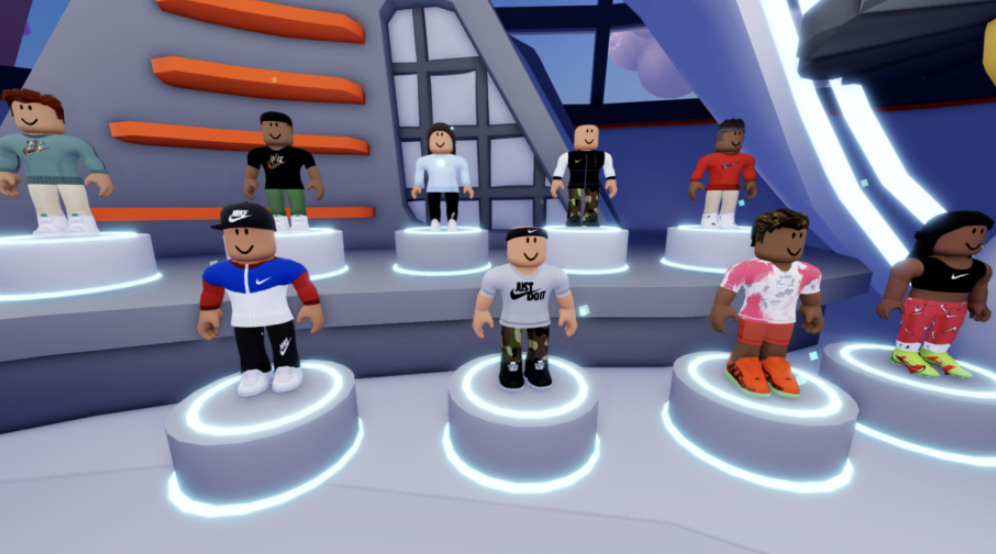 Roblox avatars with custom NIKE looks in Nikeland
Roblox avatars with custom NIKE looks in Nikeland Source: WWD [/caption]
- Adidas
Adidas and NIKE are in competition to be the first sportswear brand to master Web 3.0 and its underlying technologies. Like NIKE, Adidas launched an AR application in 2019 that allows users and customers to virtually test and try on sneakers before purchasing.
In 2020, Adidas partnered with WebAR development platform 8th Wall to debut its ecofriendly Stan Smith line of shoes, placing QR codes at various locations around the country.
[caption id="attachment_151162" align="aligncenter" width="653"]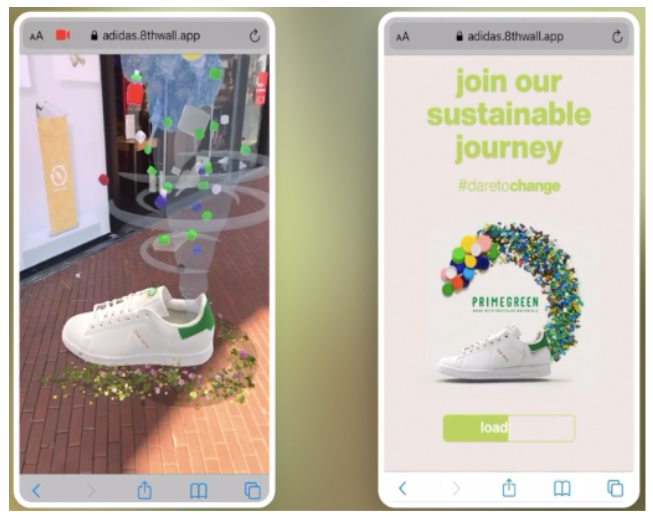 The Adidas AR advertising campaign for Stan Smith shoes
The Adidas AR advertising campaign for Stan Smith shoes Source: 8th Wall [/caption]
Adidas has also dipped its toes into the avatar market, partnering with avatar creation company Ready Player Me to launch its Originals collection of NFT avatars, which has generated over $140 million in total sales as of July 4, 2022 (converted from ETH to USD), according to CryptoSlam! (again, likely higher primary sales generated for Adidas).
In December 2021, Adidas announced a partnership with Coinbase, likely to explore metaverse and NFT payment options. Looking to establish a digital storefront or experience where customers can purchase NFT and real-world clothing, Adidas has also partnered with blockchain game The Sandbox, although details of the partnership have been kept mostly quiet.
- Snapchat and Instagram
A number of brands have partnered with social media platforms Instagram (owned by Meta) and Snapchat (developed by Snap), which have developed AR creation tools, filters and relevant camera and lens features. Merchants using these social media platforms can also access their massive user bases.
Figure 1: Selected Examples of Fashion Brands Using AR Tools on Instagram and Snapchat [wpdatatable id=2115 table_view=regular]
Source: Company reports/Coresight Research
The MetaBurnett AR Fashion Event
Hosted by women’s luxury fashion brand Burnett New York on June 15, 2022, MetaBurnett showcased the best of Burnett’s physical and virtual collections. Real-world models sported looks from Burnett New York’s Resort 2023 Collection while virtual idols simultaneously debuted digital wearable twins in Decentraland at the Meta GamiMall, utilizing the game’s creation engine. At the physical event, there was also a digital screen that displayed virtual idols and AR wearables.
[caption id="attachment_151163" align="aligncenter" width="699"]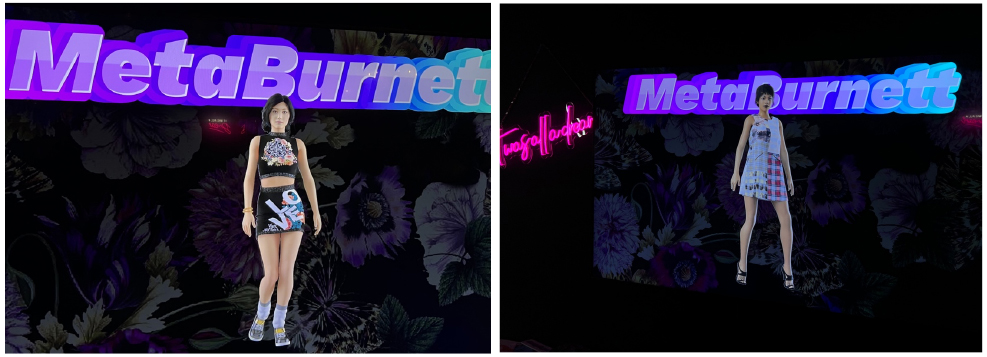 MetaBurnett virtual idols
MetaBurnett virtual idols Source: Coresight Research [/caption]
The fashion collection consisted of 1,777 unique NFTs available for purchase at the event and in Decentraland; each is attached to a real-world clothing item and an avatar wearable, powerfully linking the real and virtual worlds. The looks were developed in partnership with wearable studio Mod Wearables.
[caption id="attachment_151164" align="aligncenter" width="700"]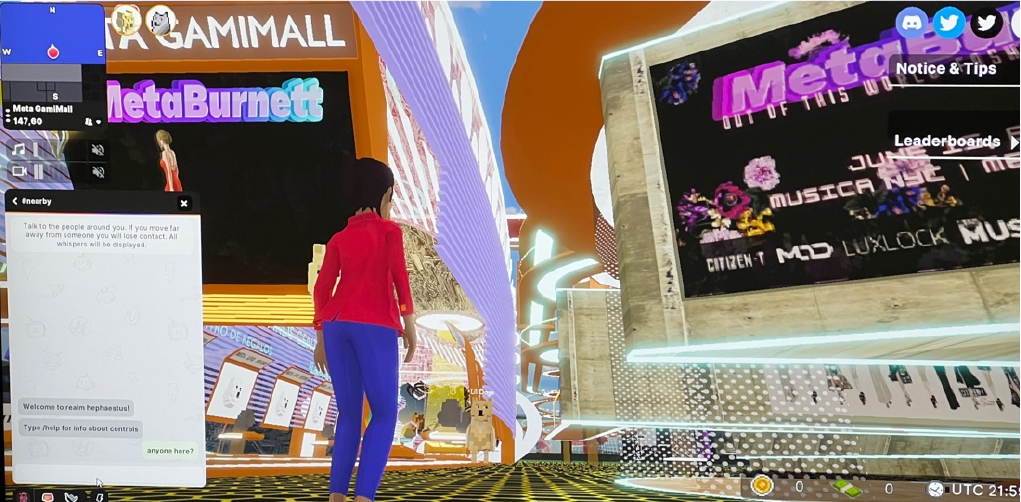 MetaBurnett at Meta GamiMall in Decentraland
MetaBurnett at Meta GamiMall in Decentraland Source: Coresight Research [/caption] The MetaBurnett event reinforced three key retail concepts:
1. Sustainability
Digital clothing and AR tools will be crucial for sustainability moving forward. MetaBurnett highlighted this fact and reported that all clothing in the collection was made from recycled materials, and designs were hand-painted by artist Stephanie Dillon. Burnett New York hopes to link the physical and virtual worlds, and in doing so, believes that customers will use virtual worlds as an outlet to express themselves and test fashion trends before trying them in the real world. Over time, this link can help to improve overall sustainability in the fashion industry and help to reduce waste and over-purchasing.2. Loyalty
Purchasing a ticket to MetaBurnett gave exclusive access to an NFT, which, over time, will unlock rewards, including prizes and products available for in-store pickup as well as access to future NFT collections. These types of dual virtual/physical events can be held on a larger or smaller scale for any type of brand looking to increase exposure in a unique and innovative way. Tying NFTs to future rewards helps to improve loyalty and build a community around a brand.3. Inclusivity
Emily Burnett, CEO of Burnett New York, built the company on the principles of diversity and inclusion. As such, the brand’s “phygital” collection features 17 sizes. In the metaverse, purchases are anonymous and anyone is free to express themselves with avatar fashion. Eventually, as camera tracking and TrueSize technology continue to improve and become essential before online and virtual world purchases for real-world items, retailers and brands can provide products in certain sizes as is needed; this can help to reduce production costs, while also minimizing returns and making the brand a welcoming one for customers of all backgrounds.What We Think
Many Web 3.0 technologies, including headsets and bodysuits for fully immersive virtual world experiences, cryptocurrencies and NFTs, are being adopted slowly but surely, and brands and retailers are still unsure of their benefits. However, as the number of digital customers continues to rise due to increased 5G and smartphone access, AR tools will allow retailers and brands to access customers and provide personalized experiences and wardrobes, no matter customers’ real-world location. In using AR tools, many brands are setting trends in how to utilize some of the metaverse’s earliest technologies, and other fashion and clothing retailers should follow their example to reap the rewards.
MetaBurnett was a unique AR fashion event that powerfully linked the metaverse with the physical world. As creator tools improve and gaming environments continue to grow their user bases, brands and retailers should look to MetaBurnett and similar events as examples to follow as they attempt to navigate Web 3.0 and the metaverse for the first time. Linking the physical and virtual worlds is a great strategy to testing out the metaverse and its offerings for merchants while still remaining rooted in reality, while also improving sustainability, inclusivity and loyalty.